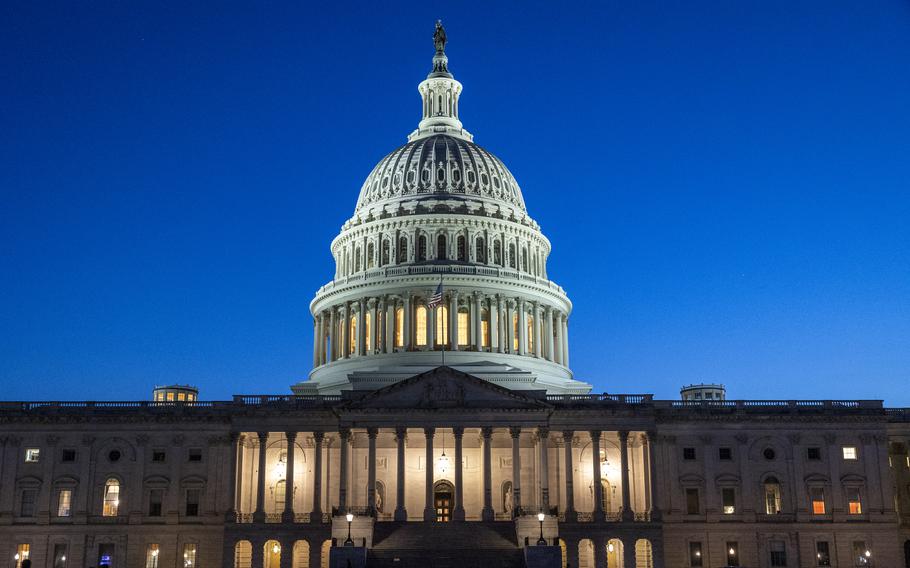
The House passed a $831.5 billion defense spending bill on July 18, 2025, by a vote of 221-209. (Eric Kayne/Stars and Stripes)
WASHINGTON — The House on Friday approved an $831.5 billion defense spending bill that keeps a flat budget for the Pentagon, provides a 3.8% pay raise for troops and cuts some 45,000 positions from the civilian workforce.
The appropriations bill passed on a 221-209 overnight vote, with Democrats overwhelmingly opposing the measure over its lack of money for an annual Pentagon program to arm Ukraine and provisions that block funding for diversity initiatives and abortion access for service members.
“We owe it to our troops and our national security to meet in the middle and put forward common sense defense legislation,” said Rep. Mary Gay Scanlon, D-Pa. “I’m afraid this bill doesn’t cut it.”
The omission of funds for the Ukraine Security Assistance Initiative stood in contrast to the House Armed Services Committee’s decision on Tuesday to authorize an extra $100 million for the program in its annual defense policy bill, bringing total funding to $400 million.
The appropriations bill funds the policy bill, which is called the National Defense Authorization Act. The Pentagon requested no funding for the Ukraine program in its budget request for 2026, which begins Oct. 1.
“By cutting all funding for Ukraine, this bill dangerously ignores history at our own peril,” said Rep. Marcy Kaptur, D-Ohio. “Ensuring that the Ukraine Security Assistance Initiative is properly funded is essential to fulfilling our charge in defense of liberty on our watch.”
An effort by Rep. Marjorie Taylor Greene, R-Ga., to add an amendment prohibiting any money in the bill from being used to assist Ukraine was defeated in a 76-353 vote, however.
The defense spending bill otherwise matches the House Armed Services Committee’s policy legislation in providing a 3.8% pay raise for troops and continuing pay increases passed by Congress last year specifically for junior enlisted service members.
The legislation also slows permanent change-of-station moves to save more than $662 million. Reducing the frequency of moves will improve the quality of life for service members and their families and offer greater stability, said Rep. Ken Calvert, R-Calif.
“It’s actually a better outcome too because they understand their role and places where they serve,” he said. “We move around a lot of our people too much.”
Calvert, the chairman of the defense appropriations subcommittee, championed the bill, though he also acknowledged it was drafted under “unprecedented circumstances,” meaning without a full budget request from the Pentagon.
“Nevertheless, the bill is reflective of key department requirements and programmatic priorities while still maintaining a fiscally responsive stance,” he said.
The legislation provides nearly $37 billion for six warships and 22 support ships, including two Virginia-class attack submarines, two Arleigh Burke-class destroyers and a Columbia-class ballistic missile submarine.
It also allocates $13 billion for missile defense and space programs to support President Donald Trump’s Golden Dome missile defense initiative and provides $1.15 billion for counter drug programs. Military jurisdiction over Mexico would shift from U.S. Northern Command to U.S. Southern Command under the legislation.
The legislation also aims to capture billions in savings by cutting almost 45,000 civilian employees from the Pentagon.
“Following the administration’s lead, this bill leans forward on shaping a more efficient and effective Department of Defense,” Calvert said.
Democrats assailed the downsizing as a continuation of the “reckless and indiscriminate” cuts initiated by billionaire Elon Musk and his cost-cutting Department of Government Efficiency. They also attacked language in the bill that they say will give the Defense Department wide latitude to reallocate nearly $8 billion.
“This provision, particularly in the context of where we find ourselves with respect to this administration and its conduct over the last seven months around impoundment, is very clearly a blank check,” said Rep. Joe Neguse, D-Colo.
Rep. Betty McCollum, D-Minn., said provisions that prohibit funding for troops to travel to seek abortions and bar spending on the Pentagon’s diversity, equity and inclusion programs also made the bill unacceptable.
“These poison pill riders will not go unnoticed by our troops and they will impact recruitment and retention,” she said.
Republicans criticized Democrats for voting against legislation that they said will make critical investments in munitions stockpiles, the defense industrial base and modernization.
“The threats we face today, from the Pacific to the Middle East, are not theoretical. They are real. Our adversaries are evolving, and they are not waiting for us to catch up,” said Rep. Mark Alford, R-Mo. “This bill helps us stay ahead.”